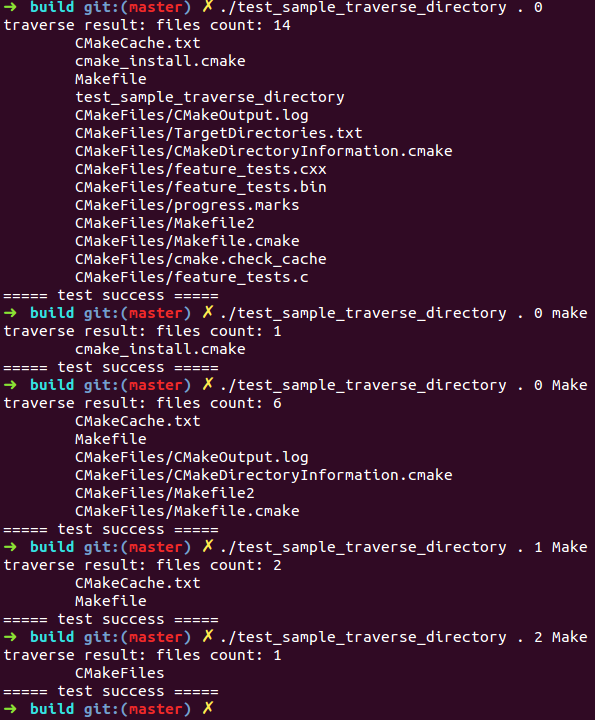之前在 https://blog.csdn.net/fengbingchun/article/details/51474728 给出了在Windows遍历指定文件夹的C++实现,这里给出在Linux下遍历目录的实现,Windows和Linux下的实现都是参考了OpenCV 2.x中的实现,OpenCV中的用法可参考https://blog.csdn.net/fengbingchun/article/details/42435901 ,OpenCV 3.x中将这一部分移除掉了。
目前不论是windows、linux还是opencv本身的实现,在目录中嵌套的目录只能遍历一层。
测试代码如下:
#include <dirent.h>
#include <string.h>
#include <iostream>
#include <vector>
#include <string>
namespace {
void Usage(const char* exe)
{
fprintf(stderr, "input params error, run this exe as following command line:\n");
fprintf(stderr, "\t%s arg1 arg2 arg3\n", exe);
fprintf(stderr, "\targ1: specify the directory to traverse\n");
fprintf(stderr, "\targ2: type:\n"
"\t\t0: tarverse all files and all directories in directory;\n"
"\t\t1: only tarverse all files, don't include directories in directory;\n"
"\t\t2: only tarverse all directories, don't include files in directory.\n");
fprintf(stderr, "\targ3: optional, filter, default is *, which is don't filter. \n");
fprintf(stderr, "for example(support relative path), only traverse jpg image:\n");
fprintf(stderr, "\t%s ./images 0 .jpg\n", exe);
fprintf(stderr, "##### test fail #####\n");
}
// 遍历指定文件夹下的所有文件,不包括指定文件夹内的文件夹
std::vector<std::string> GetListFiles(const std::string& path, const std::string& exten = "*")
{
std::vector<std::string> list;
list.clear();
DIR* dp = nullptr;
struct dirent* dirp = nullptr;
if ((dp = opendir(path.c_str())) == nullptr) {
return list;
}
while ((dirp = readdir(dp)) != nullptr) {
if (dirp->d_type == DT_REG) {
if (exten.compare("*") == 0)
list.emplace_back(static_cast<std::string>(dirp->d_name));
else
if (std::string(dirp->d_name).find(exten) != std::string::npos)
list.emplace_back(static_cast<std::string>(dirp->d_name));
}
}
closedir(dp);
return list;
}
// 遍历指定文件夹下的所有文件夹,不包括指定文件夹下的文件
std::vector<std::string> GetListFolders(const std::string& path, const std::string& exten = "*")
{
std::vector<std::string> list;
list.clear();
DIR* dp = nullptr;
struct dirent* dirp = nullptr;
if ((dp = opendir(path.c_str())) == nullptr) {
return list;
}
while ((dirp = readdir(dp)) != nullptr) {
if (dirp->d_type == DT_DIR && strcmp(dirp->d_name, ".") != 0 && strcmp(dirp->d_name, "..") != 0) {
if (exten.compare("*") == 0)
list.emplace_back(static_cast<std::string>(dirp->d_name));
else
if (std::string(dirp->d_name).find(exten) != std::string::npos)
list.emplace_back(static_cast<std::string>(dirp->d_name));
}
}
closedir(dp);
return list;
}
// 遍历指定文件夹下的所有文件,包括指定文件夹内的文件夹
std::vector<std::string> GetListFilesR(const std::string& path, const std::string& exten = "*")
{
std::vector<std::string> list = GetListFiles(path, exten);
std::vector<std::string> dirs = GetListFolders(path, exten);
for (auto it = dirs.cbegin(); it != dirs.cend(); ++it) {
std::vector<std::string> cl = GetListFiles(*it, exten);
for (auto file : cl) {
list.emplace_back(*it + "/" + file);
}
}
return list;
}
} // namespace
int main(int argc, char* argv[])
{
if (argc < 3 || argc > 4) {
Usage(argv[0]);
return -1;
}
int type = atoi(argv[2]);
std::string exten = "*";
if (argc == 4) exten = std::string(argv[3]);
std::vector<std::string> vec;
if (type == 0) vec = GetListFilesR(std::string(argv[1]), exten);
else if (type == 1) vec = GetListFiles(std::string(argv[1]), exten);
else if (type == 2) vec = GetListFolders(std::string(argv[1]), exten);
else { Usage(argv[0]); return -1;}
fprintf(stdout, "traverse result: files count: %d\n", vec.size());
for (auto& file : vec) {
fprintf(stderr, "\t%s\n", file.c_str());
}
fprintf(stdout, "===== test success =====\n");
}
CMakeLists.txt文件内容如下:
PROJECT(samples_cplusplus)
CMAKE_MINIMUM_REQUIRED(VERSION 3.0)
# 支持C++11
SET(CMAKE_C_FLAGS "${CMAKE_C_FLAGS} -g -Wall -O2 -std=c11")
SET(CMAKE_CXX_FLAGS "${CMAKE_CXX_FLAGS} -g -Wall -O2 -std=c++11")
INCLUDE_DIRECTORIES(${PROJECT_SOURCE_DIR})
FILE(GLOB samples ${PROJECT_SOURCE_DIR}/*.cpp)
FOREACH (sample ${samples})
STRING(REGEX MATCH "[^/]+$" sample_file ${sample})
STRING(REPLACE ".cpp" "" sample_basename ${sample_file})
ADD_EXECUTABLE(test_${sample_basename} ${sample})
TARGET_LINK_LIBRARIES(test_${sample_basename} pthread)
ENDFOREACH()
build.sh脚本内容如下:
#! /bin/bash
echo "Note: new create build directory, and executable file in build"
echo ${PWD}
mkdir -p build
cd build
cmake ..
make
执行过程:将终端定位到Linux_Code_Test/Samples_cplusplus目录下,执行:./build.sh,然后进入到build目录下,执行生成的执行文件即可。
测试结果如下:
